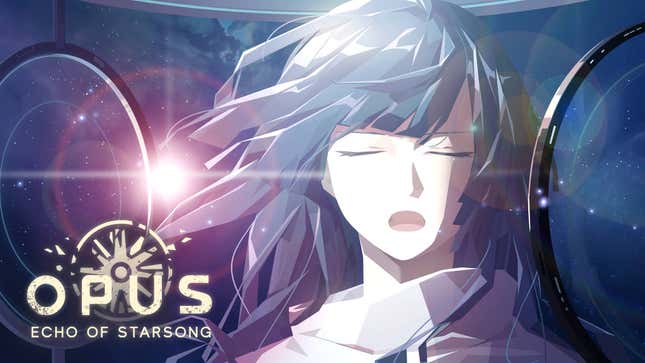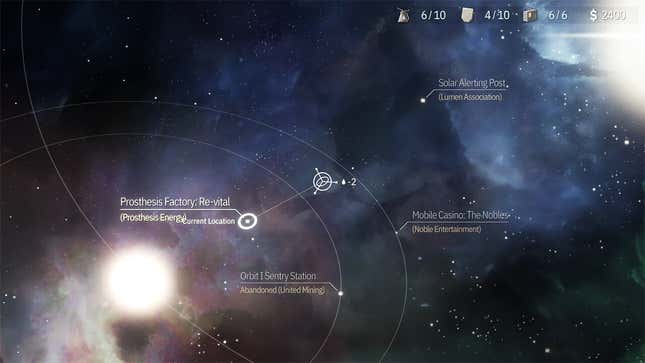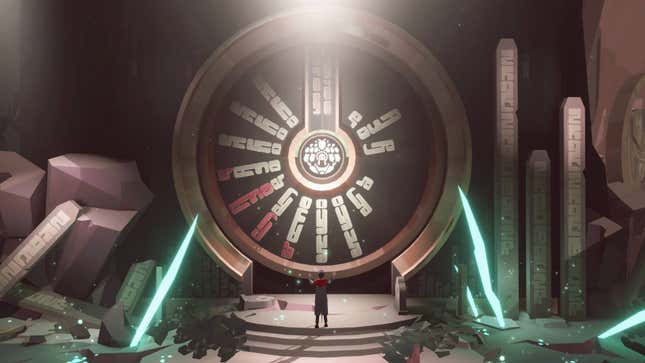
While most science fiction games ask me what it means to be human, Opus: Echo of Starsong asked me: “Is it enough to be human?” This philosophical space opera is a staggeringly emotional game that deserves a spot among indie narrative greats such as Transistor and What Remains of Edith Finch.
Mechanically, Opus: Echo of Starsong is an interesting mashup of a visual novel, a two-dimensional side-scroller, and a musical puzzle game. It’s also a resource management exploration game in the same genre as Oregon Trail. And yet, when I list these various elements, I feel like I’m underselling the game, because on its own, each element is rather mundane. However, the story integrates these varied gameplay elements so naturally that I often forgot I was playing a puzzle game.
Every element of the game is woven together by a dazzling story about three young adventurers who brave a hostile galaxy to claim caverns of divine petroleum, a highly valuable resource. Jun is a disgraced noble heir who is trying to restore his family’s fortunes. Eda is a witch who desperately seeks something important. Remi is a pilot whose only goal is to keep Eda safe from harm. These characters regularly face off against pirates and a hostile mining corporation while also struggling to find their place in an uncaring galaxy. The game is currently available on Steam for PC and Mac.
Despite mostly taking place in a narrator’s memories, Opus is a narrative game filled with choices. The game continuously forces you to assess all sorts of lethal risks. For example, do I take government jobs for badly needed money despite the bounty on my head, or do I try to stretch my fuel budget?
After assessing the risks for dozens of random events, I feel exhaustion setting in. Making choices isn’t the only thing that’s mentally taxing. It’s the constant mistrust. The first time I came across a stranded ship, I tried to help. But the occupants turned out to be pirates who took a good chunk of my supplies. I still wanted to help people, but I could never fully detach from my own paranoia. I guarded my heart carefully, and I only took a gamble when I had enough supplies to spare.
It felt horrible to trust nothing and no one just during the limited time I spent playing the game. For these characters, this was their entire life. These kids were so mistreated that I struggled to understand why they kept believing in absentee friends and family, even at the risk to their lives. But hours into Opus, I finally understood that being alone can be far worse than being hurt.
The game has a main storyline, but I was allowed to explore anywhere I wanted in the galaxy (as long as I had enough fuel). In most space exploration games, this would evoke a feeling of absolute freedom. But what does freedom mean when it can constantly be snatched away by corrupt local governments, corporations with private militaries, and powerful criminals? Can ordinary people be free when they live in systems that aren’t free? Or when they can’t take care of the weakest among them? Opus never states any of its answers outright, but its answer is clearly “no.”

I had so many questions about the galactic pantheon, and the game refused to answer those too. Whether in its dialogue or its codex of galactic knowledge, this game is consistently allergic to giving out answers. At first, I was slightly annoyed that so many mysteries had gone unresolved. But the game only ever gives you the limited perspective of three characters who are constantly on the run. Opus refuses to betray its own limitations by making information easily accessible to you.
Despite all of this, Opus manages to soften the harshness of its setting where it can. Gentle colors and music help make the Thousand Peaks galaxy a more bearable place for me as a player, though the characters are never afforded such reprieve. Opus never lets go of the cruel loneliness that shaped these brilliant, self-destructive children. To quote another critically acclaimed visual novel, The House in Fata Morgana, “You were able to bear these tragedies because they weren’t your tragedies.”
The strength of the game comes from your distance from the narrative. Opus takes place in the past, with one of the adventurers, Jun, serving as the narrator. Effectively, you pick at an old man’s wound rather than experiencing the story directly. The game feels soft only by virtue of telling its tale through the distorted kaleidoscope of Jun’s memories. Opus is masterful at implying the existence of stories that occur beyond the boundaries of “play.” I couldn’t help but wonder if there were worse cruelties that the narrator didn’t care to remember.
This ambiguity was purposefully designed. The main ship that takes you between space stations is called the Red Chamber, a clear reference to the Chinese literary classic The Dream of the Red Chamber. Both the novel and Opus blur the line between reader and participant, truth and fiction.
According to the spaceship’s namesake, “Truth becomes fiction when the fiction’s true; real becomes not-real when the unreal’s real.” Although the story has already taken place in the past, what actually happened to the narrator isn’t important. What the game recognizes as truth is how you author his story with your decisions. Despite the classical European aesthetics of Opus’ lore, the story is unapologetically Chinese. The Taiwanese developers don’t wink about the game’s Chinese influences. For those who aren’t familiar with the novel, Opus’ ending might seem confusing. But I find it refreshing that the game creates a science fiction adaptation out of a novel that players outside of Asia are less likely to be familiar with.
It’s no small feat that I felt compelled to play the game to the very end. Opus denies us surprise by starting us at the ending, but it makes the journey worthwhile. The writing is so exemplary that I was pulled along despite knowing the ending would not be a happy one. I had to stop and take a moment when a random faceless NPC told me that “The hull of this ship was cast from the souls of my brothers, and yet it’s on the verge of collapse.” I can’t decide if it’s a beautiful or a horrific statement. Does he mean that his friends died in the backbreaking work of building the hull, or that it was merely imbued with their hard labor? Whatever the truth is (and here Opus is again, with its maddening irreverence of truth), only one end awaited them.
The writing is vivid and efficient about all of its messy contradictions. The world of Opus can be beautiful, but it’s forever haunted by the consequences of its resource war. Beauty and cruelty are carefully welded together, creating a fictional world that feels more realistic to me than any open-world landscape.
Which is nice, because most of the game is split between being a resource management sim and a 2D side-scroller. Sometimes the game breaks away from 2D and shifts the angle around to reveal that the environment was built in 3D. It doesn’t happen constantly, but when it does, it lends appropriate melodrama to tense story moments. The puzzles are fairly intuitive, and I like that they don’t try to test anyone’s cleverness. I didn’t want or need to feel clever. It was enough to participate in helping the characters advance in their journey. To find the caves, you must listen to each star in an area and select the most robust song. Once you arrive at the caves, you advance by matching sound frequencies to the patterns on major doors. While it’s possible to rush through the caves, these audio puzzles encourage a slow and thoughtful play style. This delicate, deliberate pace carries over to Opus’ majestic soundtrack. The piano tracks alternate between a melancholy reminiscent of falling dewdrops and the triumphant refrain of a glorious journey.

The art style also surrenders itself to mood, rather than realism. The illustrations are rendered in blocks of bold, solid colors. The limited palette of the cavern landscapes is isolating and dull, but the greys are mostly soft and warm. Opus is quick to remind me of the loneliness of space. It needs me to remember why its heroes are willing to risk life and limb. The most poignant scenes are awash in black and white, which is a common cinematic technique for flashbacks, but it’s very effective in this visual novel game.
The dialogue feels more evocative than in many games with full voice acting and cinematic cutscenes, and the emotions running through the scenes successfully carry those visually simple moments. Opus strips away unnecessary details to better convey its emotional undertones. These design decisions gambled on my ability to feel exactly what the game wanted me to feel, and it worked every single time. I cried no fewer than eight times before I finished my first playthrough. If Opus had been a less focused game, it never would have achieved this.
It also has a codex with some of the most beautiful writing and thoughtful worldbuilding I’ve seen in a video game, but it’s inaccessible from the main menu. It’s also impossible to access after the credits roll unless you decide to wipe your file and start again. Save files are so ubiquitous in video games that I can’t help but feel that this was also intentional. Everything that happens in Thousand Peaks is so transient and temporary. There’s no reason for my save file and my collections to be permanent when nothing else is.
Opus: Echo of Starsong is a serious contender for my game of the year. While the gameplay designs and the narrative implementation are relatively simple, its execution is ambitious, and it commits to difficult emotional themes to the very end. If you’re the kind of person who eats Destiny lore for breakfast, Opus’ world will likely satiate your appetite. Even if none of these things sound like they would appeal to you, Opus might turn you into a believer.



